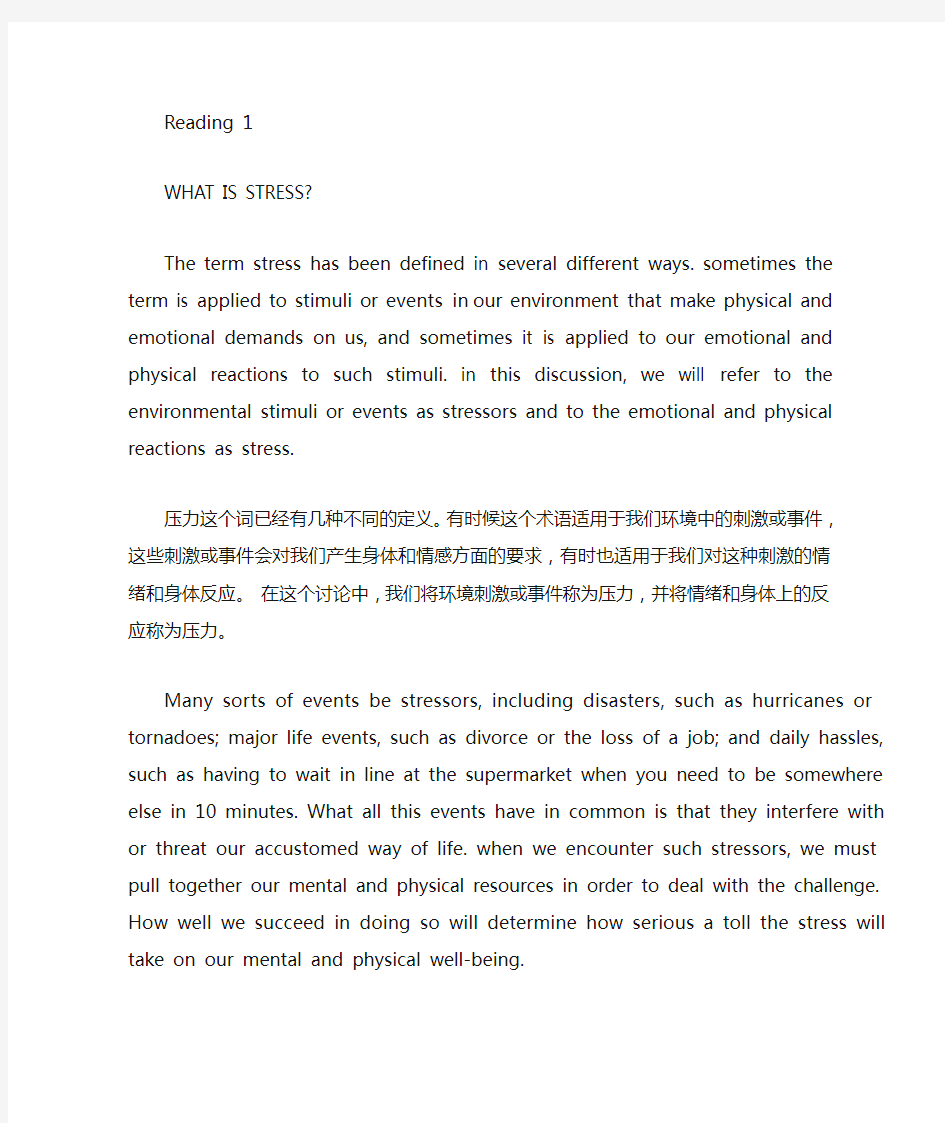
大学学术英语读写教程 下册 课文翻译
- 格式:docx
- 大小:97.72 KB
- 文档页数:40


Reading 1
WHAT IS STRESS?
The term stress has been defined in several different ways. sometimes the term is applied to stimuli or events in our environment that make physical and emotional demands on us, and sometimes it is applied to our emotional and physical reactions to such stimuli. in this discussion, we will refer to the environmental stimuli or events as stressors and to the emotional and physical reactions as stress.
压力这个词已经有几种不同的定义。有时候这个术语适用于我们环境中的刺激或事件,这些刺激或事件会对我们产生身体和情感方面的要求,有时也适用于我们对这种刺激的情绪和身体反应。在这个讨论中,我们将环境刺激或事件称为压力,并将情绪和身体上的反应称为压力。
Many sorts of events be stressors, including disasters, such as hurricanes or tornadoes; major life events, such as divorce or the loss of a job; and daily hassles, such as having to wait in line at the supermarket when you need to be somewhere else in 10 minutes. What all this events have in common is that they interfere with or threat our accustomed way of life. when we encounter such stressors, we must pull together our mental and physical resources in order to deal with the challenge. How well we succeed in doing so will determine how serious a toll the stress will take on our mental and physical well-being.
许多事件都是压力源,包括灾难,如飓风或龙卷风; 重大生活事件,如离婚或失业; 每天都有麻烦,比如当你要在10分钟内到别的地方去却不得不在超市排队等。所有这些事件都有共同之处,就是它们干涉或威胁我们习惯的生活方式。当我们遇到这样的压力时,我们必须整合我们的精神和物质资源来应对挑战。我们如何成功地做到这一点将决定压力对我们身心健康将产生多大的影响。
Reacting to stressors
The Canadian physiologist Hans Seyle has been the most influential writer on stress. Seyle proposed that both humans and other animals react to any stressor in three stages, collectively known as the general adaptation syndrome. the first stage, when the person or animal becomes aware of the stressor is the alarm reaction. In this stage the organism becomes highly alert and aroused, energized by a burst of epinephrine. After the alarm reaction comes the stage of resistance , as the organism tries to adapt to the stressful stimulus or to escape from it. If these efforts are successful, the state of the organism returns to normal. If the organism cannot adapt to the continuing stress, however, it enters a stage of exhaustion or collapse.
加拿大生理学家Hans Seyle在压力方面一直是最有影响力的作家。塞尔提出,人类和其他动物在三个阶段对任何压力源作出反应,统称为一般适应综合症。第一阶段,当人或动物意识到应激源时,就是警报反应。在这个阶段,机体变得高度警觉和激起,并被一阵肾上腺素所激发。当警报反应进入抵抗阶段后,机体试图适应压力刺激或逃避压力。如果这些努力成功,机体的状态就会恢复正常。然而,如果生物体不能适应持续的压力,它就进入衰竭或崩溃的阶段。
Seyle developed his model of the general adaptation syndrome as a result of research with rats and other animals. In rats, certain stressors, such as painful tail-pulling consistently led to the same sorts of stress reactions in humans, however, it is harder to predict what will be stressful to a particular person at a particular time. Whether a particular stimulus will be stressful depends on the person’s subjective appraisal of that stimulus. How threa tening is it? How well have I handled this sort of thing in the past? how well will I be able to handle it this time? for one person, being